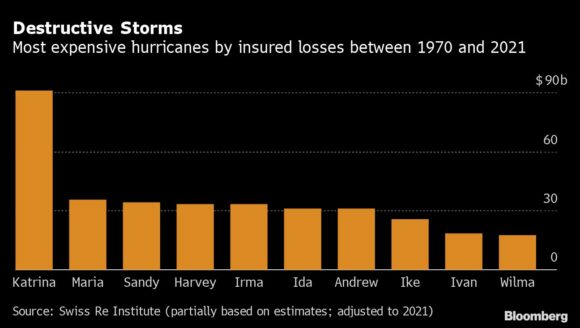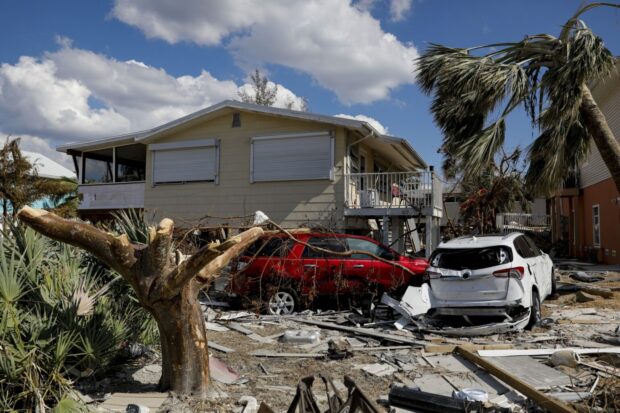Munich Re said it will probably take a hit of about 1.6 billion euros ($1.6 billion) after hurricane Ian led to massive damages in Florida, and warned reaching its full-year profit goal has become “significantly more challenging.”
The estimate of losses from the storm is “subject to substantial uncertainty,” the company said in a statement Friday. Shares of the reinsurer rose after saying it expects to post a higher-than-expected profit of about 500 million euros [$489.3 million] for the third quarter, helped by a one-off effect at its Ergo life unit.
Ian hit Florida in September and was one of the strongest hurricanes to ever make landfall in the U.S. It carved a trail of ruin across southern Florida, downing bridges, inundating roads and shattering homes. Insured losses have been estimated at more than $60 billion. (Related article, “All The Latest Insurance Company Estimates: Hurricane Ian Losses”)
Swiss Re AG warned earlier in the week that it will post a third-quarter loss and may not reach a profitability goal for this year because of claims tied to the storm.
Munich Re said reaching its target for a profit of 3.3 billion euros this year now depends on the “realization of currently anticipated positive one-off effects, particularly regarding investments.”

Shares of the company rose 1.1 percent at 1:32 p.m. in Munich, paring declines this year to 3.2 percent.
“The scale of Hurricane Ian’s losses, particularly in Florida, will likely mean insured losses will drift higher as inflation and litigation add to the toll,’ Bloomberg Intelligence analysts wrote in a note. “Hurricane Ian could turn out to be a record-breaking storm.”
The most expensive hurricane for the industry so far since 1970 was Katrina with $91 billion in insured losses, followed by Maria and Sandy with about $35 billion each.
At Munich Re, the losses from Ian add to a number of other headwinds in the wake of financial markets volatility and the war in Ukraine. In the second quarter, the company took a hit of almost $1 billion to its investment portfolio. It also wrote down the value of Russian and Ukrainian bonds by almost 700 million euros in the first quarter and booked war-related reinsurance costs in the three-digit million euro range.
Photograph: A destroyed house following Hurricane Ian in Fort Myers Beach, Fla., on Tuesday, Oct. 4, 2022. Photo credit: Eva Marie Uzcategui/Bloomberg





















 How Americans Are Using AI at Work: Gallup Poll
How Americans Are Using AI at Work: Gallup Poll  Berkshire-owned Utility Urges Oregon Appeals Court to Limit Wildfire Damages
Berkshire-owned Utility Urges Oregon Appeals Court to Limit Wildfire Damages  Retired NASCAR Driver Greg Biffle Wasn’t Piloting Plane Before Deadly Crash
Retired NASCAR Driver Greg Biffle Wasn’t Piloting Plane Before Deadly Crash  Earnings Wrap-Up: AXIS Expanding Insurance Biz, Shrinking Re Book
Earnings Wrap-Up: AXIS Expanding Insurance Biz, Shrinking Re Book 




